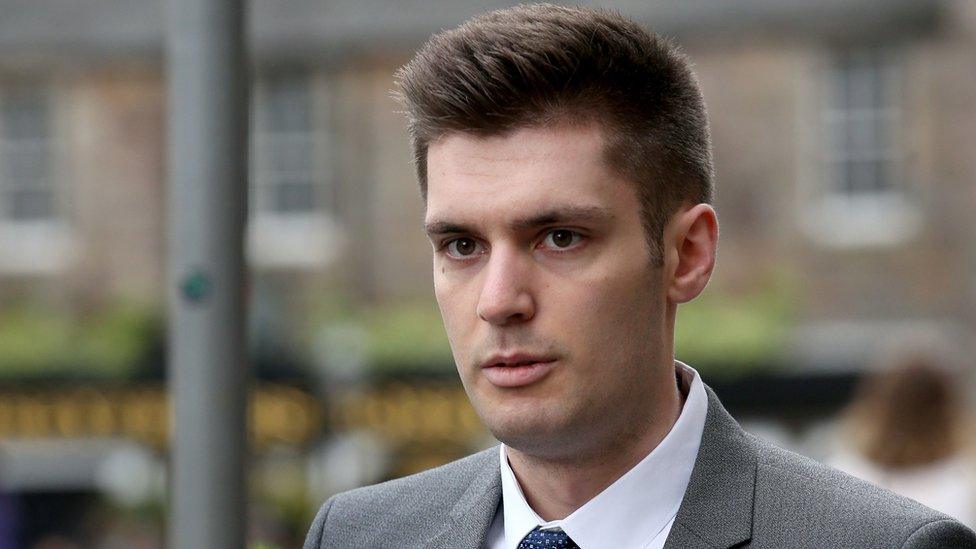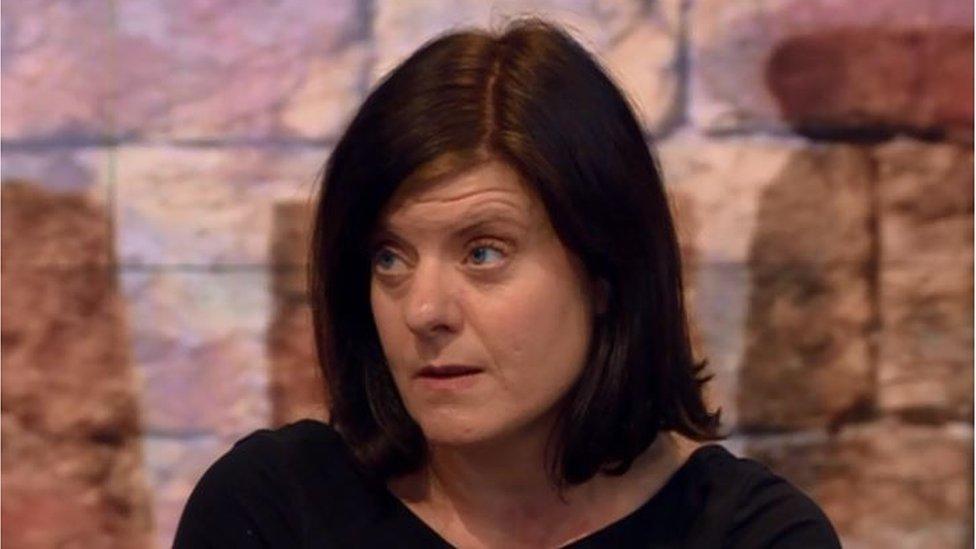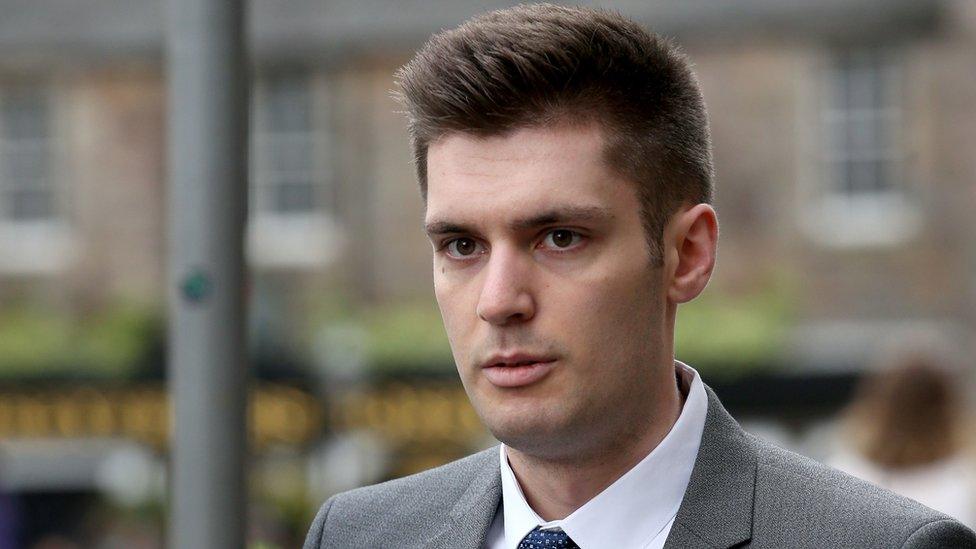Victim slams not proven criminal rape case as 'a disgrace'
- Published
'Miss M' tells 5 Live Breakfast how she won £80,000 in damages from a man who had been cleared of raping her
A woman who sued her rapist in a civil court has called the criminal trial which freed her attacker a "disgrace".
The 23-year-old victim, known as "Miss M", was awarded £80,000 in damages in October after a five-year fight for justice.
She sued Stephen Coxen from Bury in Greater Manchester .
The second year student said she was raped after a night out in St Andrews in 2013 by Mr Coxen, who she had met earlier in the evening.
Mr Coxen, now 23, had denied the charges and in November 2015 a jury found the case against him not proven.
In a legal first in Scotland, a sheriff in the civil action ruled Mr Coxen raped the woman, known as Miss M, and demanded he pay damages.
Civil cases require a lower standard of proof than criminal cases, with judgements made on the balance of probabilities rather than beyond reasonable doubt.
Miss M has told the BBC she was "let down" by the Crown in her criminal trial and she felt she was not involved in the case.

Stephen Coxen had denied the rape charges against him and the case was found not proven in a criminal court
She told Victoria Derbyshire: "A civil action has a lower burden of proof but why did we have more expert witnesses and more evidence than we did in a criminal trial where the burden of proof is different?
"Honestly, my own opinion is that I was let down in the criminal justice process."
'The Crown failed'
She added: "I think my case wasn't investigated as well as it could have been and I think it is shocking that someone - me - that's been through the case, who has lived every moment of the incident was not involved in any decisions, any input of witnesses, anything. I felt so let down by that.
"From the disgrace of the criminal justice process and how the Crown represented my case, I think the Crown failed in that.
"Hopefully they will look into other cases in the future and other women won't have to go through the fight that I had to go through."
During the civil trial at the Personal Injury Court in Edinburgh, Sheriff Robert Weir said the evidence from Miss M had been "cogent, compelling and persuasive".
He said that Mr Coxen took advantage of her when she was incapable of giving meaningful consent because of the effects of alcohol.

The case
The sheriff heard that Mr Coxen, who was then 18, had driven up from Manchester to visit a friend at St Andrews University.
Mr Coxen met Miss M, who was an 18-year-old student, at the Lizard Lounge in the town.
She is reported to have been seen kissing with Mr Coxen in the club's smoking lounge.
Mr Coxen was ejected from the premises close to 02:00, after being involved in an altercation.

The woman bringing the case was a student at the University of St Andrews
Miss M's next memory was standing at the gates outside her flat beside a man she didn't know.
She rang the buzzer, hoping that her flatmates would answer.
Mr Coxen became frustrated as she "played for time", searching in her bag for the house keys.
Miss M then dropped her keys. Mr Coxen unlocked the gate himself and used the keys to gain entry to the flat, where he raped her.
Over the next few months, Miss M is said to have been prescribed a number of different types of medication to deal with depression, panic attacks and sleep disturbance.
She reported the attack in January 2014. Mr Coxen denied rape and said they had consensual sex.

Rape Crisis Scotland's chief executive Sandy Brindley agreed the victim's lack of involvement in criminal proceedings was not acceptable.
She said; "Miss M has described being on the periphery of the case. Part of that difficulty comes from being a witness to a crime committed against you, so you don't have any standing in the case."
Ms Brindley believes the Scottish not proven verdict is also a significant issue.
'No consequences'
She said: "It is used commonly in rape trials and there is a worry that juries might be reluctant to convict in rape cases and the not proven verdict gives them an easy out."
She also said the Scottish government had started some research into jury decision-making in rape trials.
She explained: "One of the things they are considering is if juries understand what the not proven verdict means.

Sandy Brindley from Rape Crisis thinks the not proven verdict is "an easy out" in a rape trial
"It has the exact same impact as a not guilty verdict. It is an acquittal.
"There are no consequences at all for the accused from the not proven verdict.
"It means there is not enough evidence to find guilty but they haven't felt able to go for a not guilty verdict. It is just as devastating as a not guilty verdict for a victim."
A Crown Office spokesman said: "Stephen Coxen was prosecuted in the High Court and was acquitted by a jury following trial.
"Prosecutors take crimes of rape and sexual offences extremely seriously and we are committed to ensuring that all such cases are investigated thoroughly and sensitively and are prosecuted appropriately.
"Victims of such offences can be confident that they will be treated with the utmost professionalism and sensitivity by everyone involved in the investigation and prosecution and we will do all we can to deliver justice for them.
"We note the judgement of the court in the civil case."
'A survivor'
After her legal victory, Miss M said she was relieved that now someone had acknowledged the actions of Stephen Coxen were wrong and unlawful.
She is now vowing to fight for others.
She said: "I was a victim but now I am a survivor and for me it is about moving on. I am never going to stop fighting for other women.
"I can and I will continue to try to help other people who have been wrongly subjected to something like Stephen Coxen did to me."
- Published5 October 2018

- Published13 June 2018

- Published27 March 2018
